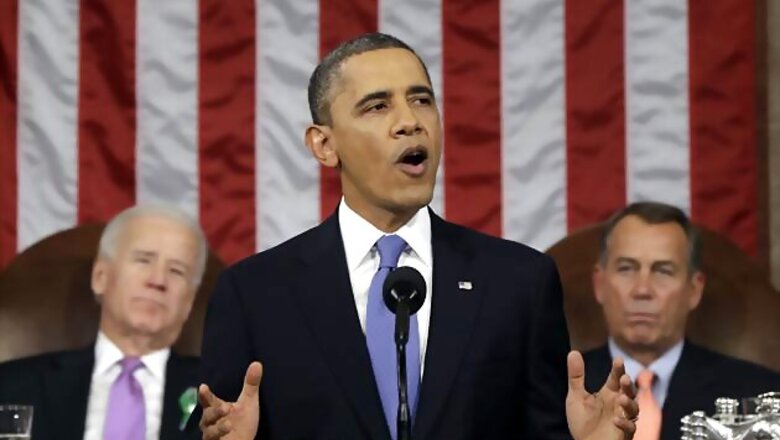
views
Washington: US President Barack Obama declared the nation is unquestionably stronger on Tuesday night in in his first State of the Union address since winning re-election, though he conceded America's economic revival is an "unfinished task". He challenged a deeply divided Congress to compromise in the country's interest on ways to boost job creation and strengthen the middle class.
In specific proposals for his second term, he called for increased federal spending to fix the nation's roads and bridges, the first increase in the minimum wage in six years and expansion of early education to every American four-year-old. The president also pledged to cut the number of US troops in Afghanistan in half within a year.
In a speech centered squarely on jump-starting the economy, Obama sought support from Republicans by asserting that his proposals would not increase the deficit "by a single dime." But with unemployment persistently high and consumer confidence falling, he pressed a case for a significant government role in reigniting economic growth. "The American people don't expect government to solve every problem; they don't expect those of us in this chamber to agree on every issue," he said. "But they do expect us to put the nation's interests before party. They do expect us to forge reasonable compromise where we can. It is our unfinished task to restore the basic bargain that built this country - the idea that if you work hard and meet your responsibilities, you can get ahead, no matter where you come from, what you look like, or who you love," Obama said, speaking to a joint session of Congress and a television audience of millions.
Florida Sen. Marco Rubio, a rising Republican star, sought to draw a contrast with Obama in excerpts of his GOP response, saying economic opportunity isn't bestowed on us from Washington. "It comes from a vibrant free economy where people can risk their own money to open a business. And when they succeed, they hire more people, who in turn invest or spend the money they make, helping others start a business and create jobs," Rubio said in the excerpts, released before Obama spoke.
The US President's address marked the most specific outline of his second-term agenda since winning re-election, and included proposals for increased spending on manufacturing, infrastructure and education. His focus on jobs and growth underscored the degree to which he is still hampered by the economy, even as he pursues a bolder agenda including overhauling the nation's immigration laws, enacting stricter gun-control measures and tackling climate change.
Obama's proposals, many of which are repackaged versions of initiatives that stalled in his first term, face an uncertain future on Capitol Hill, where Republicans retain control of the House. The GOP is most ardently opposed to Obama's calls for legislating more tax revenue to reduce the deficit and offset broad automatic spending cuts - known as the sequester - that are to take effect on March 1.
The US President was uncompromising in call for bringing down the deficit through a combination of tax increases and targeted spending cuts, though he has offered few specifics on either. He did reiterate his willingness to tackle entitlement changes, particularly on Medicare, though he has ruled out increasing the eligibility age for the popular benefit program for seniors.
Pivoting briefly to foreign policy, Obama announced a scaling back of the US military footprint abroad, with 34,000 American troops withdrawing from Afghanistan within a year. He also sharply rebuked North Korea for its latest nuclear launch, warning that the impoverished nation's nuclear program has only further isolated it from the international community. North Korea said on Tuesday that it successfully detonated a nuclear device in defiance of U.N. warnings.
Despite the challenges abroad, Obama said it is economic growth that serves as his "North Star." He challenged a Congress often stalled by partisan bickering to focus on three key principles: attracting more jobs to the US, equipping Americans with the skills to compete for the positions and making sure hard work leads to a decent living. "It is our generation's task, then, to reignite the true engine of America's economic growth - a rising, thriving middle class," Obama said.
Seeking to increase wages for 15 million Americans, Obama called for raising the federal minimum wage from $7.25 to $9 by 2015. The minimum wage has been stagnant since 2007, and administration officials said the increase would strengthen purchasing power. The US President also wants Congress to approve automatic increases in the wage to keep pace with inflation. Republican presidential candidate Mitt Romney backed a similar proposal during last year's campaign.
Obama also renewed his calls for infrastructure spending, investments he sought repeatedly during his first term with little support from Republicans. He pressed lawmakers to approve a $50 billion "fix it first" program that would address the most urgent infrastructure needs.
Education also figures in Obama's plans to boost American competitiveness in the global economy. Under his proposal, the federal government would help states provide pre-school for all 4-year-olds. Officials did not provide a cost for the pre-school programs but said the government would provide financial incentives to help states.
Among the other initiatives Obama is proposing:
- A $1 billion plan to create 15 "manufacturing institutes" that would bring together businesses, universities and the government. If Congress opposes the initiative, Obama plans to use his presidential powers to create three institutes on his own.
- Creation of an "energy security trust" that would use revenue from federal oil and gas leases to support development of clean energy technologies such as biofuels and natural gas
- Doubling of renewable energy in the US from wind, solar and geothermal sources by 2020.
Tuesday night's address marked Obama's most expansive remarks on the economy since the November election. Since securing a second term, the president has focused more heavily on new domestic policy proposals, including immigration changes and preventing gun violence following the horrific shooting of schoolchildren in Newtown, Conn.
The president largely reiterated those proposals, but offered no new specifics. But on gun violence in particular, some of the atmospherics of the annual address were aimed at pressuring reluctant lawmakers to back Obama's calls for universal background checks for gun purchasers and bans on assault weapons and high-capacity ammunition magazines.
First lady Michelle Obama sat with the parents of a Chicago teenager shot and killed just days after she performed at the president's inauguration. More than two dozen lawmakers invited gun violence victims and their families to attend the speech as their guests. Republican Sen. John McCain and Democratic Rep. Ron Barber, both of Arizona, attended with their former congressional colleague, Gabrielle Giffords, who was wounded in a 2011 attack.
Republican Rep. Steve Stockman of Texas invited rock music performer Ted Nugent, a long-time gun control opponent who last year said he would end up "dead or in jail" if Obama won re-election.
Obama also called on Congress to tackle the threat of climate change, another issue that eluded him in his first term. The president pledged to work with lawmakers to seek bipartisan solutions but said if Capitol Hill doesn't act, he'll order his Cabinet to seek steps he can take using his presidential powers.
####




















Comments
0 comment